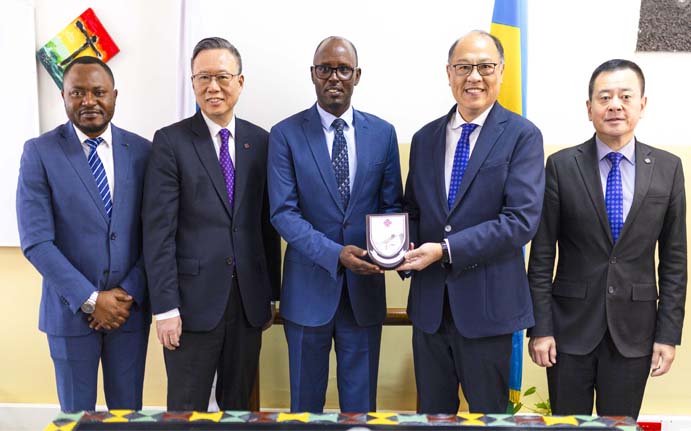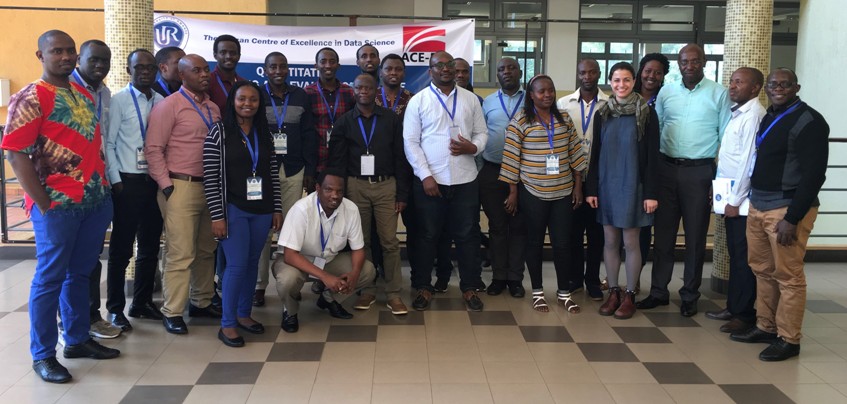
Mastercard Foundation scholars urged to be a shining example amid summer camp
- 28-06-2024
- 394
The call for the establishment of the different African Centres of Excellence (ACEs) came at a time when the Government of Rwanda observed gaps in the science field.
The gaps were apparently more pronounced in terms of qualified personnel dealing with big data. And as result, there was need to deliver quality post-graduate education and build collaborative research capacity.
This was intended to be done in five regional priority areas : Industry, Agriculture, Health, Education and Applied Statistics.
Data Science is an interdisciplinary course that combines expertise in statistics, computer science, and mathematics among other fields in science.
Dr Charles Ruranga, the Director of African Centre of Excellence in Data Science, says the call for the establishment of the African Centres of Excellence was in effort to fill gaps in these different areas.
The particular program-African Centre of Excellence in Data Science (ACE-DS) is one of the 24 Eastern and Southern Africa Higher Education Centres of Excellence.
Operating at University of Rwanda (UR), its core mission is to train post-graduate students with combined expertise in statistics, economics, business, computer science, and engineering to use big data and data analytics to solve development challenges.
The genesis
The Eastern and Southern Africa Higher Education Centres of Excellence (ACE II) is a World Bank –funded Project and is now operational with 24 ACEs from 8 countries.
Dr. Ruranga reveals that after drafting the proposal, an application was consequently submitted putting into consideration the World Bank’s rations. This was in 2015.
“After conditional selection a field visit was conducted before final selection. This Centre was established at University of Rwanda as an agreement between the World Bank and the Government of Rwanda on 17th October 2016,” Dr. Ruranga says.
Currently, the total number of 24 Centres have been established for ACE II in Eastern and Western Africa with Rwanda having 4 Centres of excellence that deal with Data science (ACE-DS), the Internet of Things (IoT), Energy (ACEESD) and Teaching and learning Mathematics and sciences (ACEITLMS).

The main activities of the center are postgraduate training (Masters and PhD), short courses and conducting collaborative applied research.
Criteria for admission
In regards to enrolment, Dr. Ruranga says a call is normally made where those planning to enrol for the Master’s program are required to have at least BSc honours with upper division.
“After receiving the applications, we rank them according to their marks. And the best candidates are selected. There are also some who come from the workforce ; these can be admitted based on experience. This is done in order to build capacity for the current work-force,” he notes.
The first in take for the master’s program have completed their first year and now there is the second intake and the second intake for PhD program as well.
Students are from different countries such as Rwanda, Kenya, Tanzania, Uganda, Malawi, Ethiopia, Democratic Republic of Congo, Cameroon and Zambia among others.
The Centre also offers short courses for example in machine learning, Data analysis, monitoring and evaluation among others.
Some courses offered for Masters and PhD include data science in data mining, econometrics, biostatistics, actuarial science, demography- these are the five exit at MSc and PhD levels.
“We call onto those who are working in these fields, we offer a lot that they can learn from ; this can also add to their experience.”
Challenges
During implementation, Ruranga reveals that ACEDS faced challenges as a new program. “But we got support from the University of Rwanda, the Ministry of Education, IUCEA, World Bank and many other partners. Through regular technical and advisory meetings (TAM) organized by EUCEA every six months- where all the 24 Centres meet and share experiences- we managed to pull through,” the Director says.
Progress with implementation
There are Professors/Lecturers from different countries and partner institutions available to handle specific modules ; this is also for PhD supervision.
“We have supervisors from the University of Rwanda but also from other partner institutions. We also have what we call “PhD Symposium” that is organized two times a year where all PhD students and their supervisors are invited for a meeting for a one-week research seminar. This event gives PhD students opportunity to present progress of their theses”, Dr. Ruranga narrates.
“The Centre has computer labs and we even bring experts in the field for different tutorials. I can say that we have the best students and we want to see them shine on the job market”, he adds.
Dr. Ruranga observes that with such skills, students will not only be an ingredient to the market but will also respond to the challenging needs hence filling the gap not just in Rwanda but also in the whole of Africa.
Students at the centre have a chance for scholarships and access to loans from Government of Rwanda through the Higher Education Council (HEC).
The Director says that these Centres are certainly contributing to the quality of education in Rwanda, noting that this could not have been possible without the support of partners such as universities, industries, and the private sector among others.
“We are also looking for a way to sustain this after the World Bank support. And since this is a regional initiative, we need students, staff and others who are involved, so we also need to have international bodies in our schools. That is the current status”, He concludes.
Source :
editor@newtimesrwanda.com